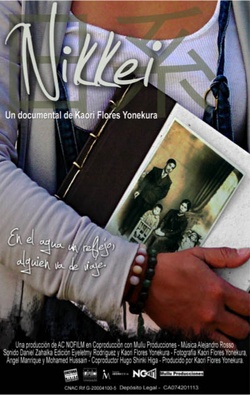Las conversaciones a la distancia generalmente están teñidas con instrascendencia -a menos que sea una discusión- pero depende de cada uno mantener una altura óptima para que la opinión e información se conviertan en fuentes de interés que generen curiosidad, debate, otras opiniones y comentarios.

El afiche de su documental largometraje Nikkei (diseñado por Kaori) (Cortesía por Kaori Flores Yonekura)
Para esta primera conversación, pregunté a Kaori Flores Yonekura, cineasta venezolana que estuvo unos días en el Perú, hace meses, si le interesaba generar opinión de forma digital y a miles de kilómetros (no nos conocemos personalmente).
La respuesta positiva de Kaori produjo una corta conversación que, tal vez, despierte susceptibilidades o viejas inquietudes aún latentes, sin resolver en la mente de muchos Nikkei alrededor del planeta.
Sobre Kaori, es documentalista sansei venezolana, egresada de la Escuela Internacional de Cine y Televisión de San Antonio de los Baños. Ha dedicado su labor a temas sobre la cultura latinoamericana, el indigenismo y los derechos humanos. Ha realizado más de una treintena de documentales, individual y colectivamente, y su última obra "Nikkei" está enfocada a la construcción de la identidad a partir de la inmigración japonesa a América Latina.
Temas principales de la conversación: Jóvenes Nikkei, Kenjinkai, participación.
VICTOR: ¿Cuál es tu impresión general de la colectividad Nikkei en Venezuela? En Lima, la participación es reducida y siempre son los mismos, los que más "compromiso" tienen con sus ancestros y las instituciones que aún existen.
La mayoría sigue siendo parte de los Kenjinkai por costumbre y porque fueron fundados por sus padres o abuelos pero no hay mayor sustento ya que las actividades son iguales y los jóvenes casi no participan porque siempre es lo mismo, incluso, ese es mi caso.
KAORI: Hubiese querido no hacer una comparación de la colectividad... entre Perú y Venezuela, pero luego de tu comentario agregado a la pregunta, no tengo más que comentarte lo siguiente.
Yo siempre he pensado que las estructuras verticales con el tiempo deben renovarse, si bien se necesita una institucionalización del colectivo para cumplir con condiciones de financiamiento, o sustentación, creo que la mejor manera es el funcionamiento de la comunidad como una Red. Yo no participo de actividades tradicionales del colectivo, no porque me agrade, sino porque desde mi lugar dentro de la comunidad me siento representada a través de mi trabajo como cineasta, que en principio es observativo y luego de activismo a través del ensayo (con mi cámara), uso para ello lo que me parece conmovedor y poderoso del ser Nikkei, que es a final de cuentas, una de las formas del ‘ser’ latinoamericano.
Estoy segura que, cada quien desde su lugar y sus posibilidades, haciendo lo que haga: pinte, dibuje, escriba, cocine ó comercie... y lo haga bien, 'hace lo que debe hacer' para nuestra comunidad, eso sería un trabajo en red que a través de los Kenjinkai como promotores culturales, podrían poner a circular en los medios a su alcance... esta sería mi sugerencia, luego de escuchar constantemente este asunto de la falta de participación en las actividades institucionales.
Yo invitaría a las organizaciones Nikkei (federaciones, asociaciones y otro tipo de organizaciones) a revisar su estructura filosófica y organizacional (la verticalidad), si la montaña no viene... es posible que debamos ir a ella.
VICTOR: También pienso que las estructuras verticales deben renovarse, incluso pienso que no son necesarias cuando todos apuntan en el mismo camino positivo. Pero eso es algo que no ha pasado porque, a pesar de existir la voluntad de "dar el espacio a las generaciones jóvenes" la imagen general no ha cambiado, es decir, sólo se busca que los jóvenes hagan lo que los viejos hicieron y también los padres de éstos.
Cuando regresamos de Panamá -mi familia y yo- empecé a participar con intensidad en todas las actividades a las que era invitado pero desistí, años después, cansado de hacer lo mismo en todas las celebraciones anuales.
Hoy, veo con otros ojos (distantes, sí) a la colectividad Nikkei en el Perú: se ha formado lo que hay porque se trabajó muchísimo; se construyó una imagen que se trata de mantener después de 3 ó 4 generaciones de envejecimiento.
Entiendo ese pensar pero para mí es un pesar ya que se repite el pasado.
Cuando participaba siempre mencionaba el cambio, la renovación -hasta del color de las paredes- pero todo hizo eco a todo nivel institucional.
Hoy sólo soy asistente cuando las ocupaciones me lo permiten, generalmente en paseos (también me sirve para cambiar de "aires").
De los Kenjinkai como promotores culturales, también sugerí mostrar su devenir a través de sitios web pero no caló la idea porque esperan "a ver qué pasa" después de que alguien se aventure a hacerlo… y hasta ahora nadie lo ha hecho.
Pienso que cada Kenjinkai podría convertirse en una especie de promotor específico como edición de libros, organización de festivales, fotografía de Japón, etc. Las ideas son infinitas pero las acciones no lo son porque son restringidas por la forma de pensar.
Los Nikkei en el Perú nos hemos forjado una imagen de honestos, trabajadores, responsables y puntuales además de callados y fáciles de aprovechar. Como todo, hay de bueno y de malo.
Mas esta buena imagen no va más allá porque el interés de los jóvenes, hoy, es vivir lo que la sociedad les demanda e impone perdiendo su identificación con el grupo étnico (nada es obligatorio, claro).
Por eso opté por escribir (además de ser un desahogo) para que, a través de la lectura se den pequeñas reflexiones por vez.
KAORI: Esta reflexión tuya "vivir lo que la sociedad les demanda e impone perdiendo su identificación con el grupo étnico" (lejos de desestimar los esfuerzos del colectivo Nikkei en la construcción de su imagen), siempre lo visualizo como una especie de trono de la virtud, se que puede verse exagerado, pero es una metáfora que uso para explicar que toda esta 'demanda de virtudes' puede volverse contra nosotros como colectivo por su rigidez: más que disfrutar de sentarse en el trono, lo terminas cargando a cuesta.
Y como digo, no es un asunto de que esté mal el inculcar valores morales respecto al correcto desempeño en el trabajo y en la sociedad, sino el hecho de la rigidez con la que se ‘debe’ cumplir con ello, y así hemos llegado a crear un estereotipo de comunidad, altamente demandante, con resultados positivos y otros negativos que no se deben invisibilizar:
- Un ejemplo tangible es el de los resultados de la frustración de algunas personas en el Japón cuando no llegan a cumplir con las demandas sociales: Hikikomori e incluso suicidios entre otros.
- Segundo ejemplo tangible: la autoexclusión de los nikkei de las actividades del colectivo.
Hay una novela interesante, llamada "Indigno de ser humano, de Osamu Dazai, de quien Mishima dijo: «Dazai fue un escritor que se esforzó en exponer precisamente lo que yo más quería ocultarme a mí mismo.»
VICTOR: Es cierto lo que denominas Trono de la virtud; son los ideales y anhelos heredados (y mal heredados, en muchos casos) mantenidos hasta hoy, sin fundamento sólido. Estas ideas "antiguas" son las que hacen que la juventud Nikkei se "abra" de sus orígenes orientales para tratar de hacer su propia vida -como debe ser siempre que queramos aprender a Vivir-.
Por ello la juventud Nikkei no participa, no tanto por falta de interés como se le juzga sino por falta de motivación.
Los "viejos" quieren que los jóvenes hagan lo mismo que ellos pero sólo tratan de imponer su forma de pensar, actuar, hablar y hasta de vestir pero la invasión mediática -una de las variables que la juventud debe sobrellevar- es más fuerte que lo heredado.
Sigue habiendo esfuerzo de la colectividad Nikkei peruana para permanecer en el tiempo (imagino que todas las colectividades latinoamericanas viven similar situación) pero sólo a través de la insistencia, no de nuevas propuestas, nuevas estructuras colectivas, nuevas formas de comunicación; así, la identificación de la juventud se sigue perdiendo, cada vez más rápido.
Dicen que estamos en sexta generación pero, desde la tercera, a muchos sólo quedan los ojos orientales como identificación con sus genes.
Es cierto lo que mencionas sobre la rigidez que tratan de imponernos para cumplir con lo que también tratan de imponernos. De esta forma, muchos crecen haciendo cosas por obligación y no porque deseen hacerlo, produciendo vidas frustradas y torcidas llenas de ira e intolerancia además de auto represión (enmascarada de tolerancia y aceptación) cuando están rodeados de sus "pares", otros Nikkei.
También es cierto la autoexclusión de los Nikkei respecto al colectivo, pero detallo que el primer colectivo es la sociedad en general: muchos Nikkei tienen amistades sólo Nikkei, hacen negocios sólo con Nikkei y comen sólo en restaurantes Nikkei. Es una discriminación a la inversa, incluso podría ser auto discriminación ya que la cambiante sociedad nos ofrece muchísimo más que ese mundo pequeño y siempre igual.
Además, hay que comentar que hay Nikkei que se autoexcluyen de su propia colectividad en negación de sus orígenes (lo he visto en mi familia) tal que no participan en ninguna actividad, no comen alguna comida con trazas japonesas (hoy hay mucha fusión, lo mejor de ambas culturas y muchas veces mejor que ambas), no utilizan palabras japonesas y menos perpetúan costumbres del hogar en el que fueron criados. Esto es producto de la imposición que creó traumatizaciones juveniles y que les hace negar, en debilidad en vez de enfrentar, lo que no les gustó de sus vidas familiares.
Todos deseamos ocultar lo que no nos gusta de nosotros y eso mismo rechazamos cuando lo vemos en otros, como un espejo.
La colectividad Nikkei tiene mucho por hacer dentro de sí, como grupo y como individuos. De lo primero, abrirse a la sociedad, integrarse sin discriminación ni preferencias y de lo segundo, cambio interior en cada uno hacia la Bondad ya que creo que es más fácil porque la colectividad siempre ha sido pasiva -salvo excepciones iracundas e intolerantes- y por ende dispuesta a escuchar, escucharse y autoevaluarse.
Muchas gracias, Kaori, por tu tiempo y dedicación.
Con pequeñas acciones como esta podemos llamar a reflexión para que todos conozcan más de los Nikkei y que los mismos Nikkei reflexionen sobre su situación tal que se dé un cambio para beneficio de toda la colectividad Nikkei y esto se vea reflejado en las sociedades a las que pertenecen.

Kaori grabando en el Museo de Inmigración al Extranjero de JICA en Yokohama (La foto la tomo Eriko Aparcero, Cortesía por Kaori Flores Yonekura)
© 2012 Victor Nishio Yasuoka







